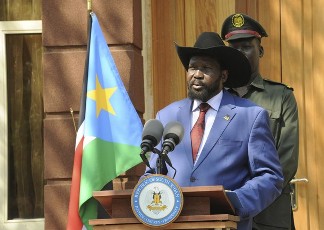South Sudan vows to honour peace agreement
May 10, 2014 (JUBA) – South Sudanese president Salva Kiir pledged that his administration would respect Friday’s ceasefire agreement signed with rebels led by the country’s former deputy, Riek Machar.

The country’s two rival leaders agreed on Friday to stop fighting and allow humanitarian access to the affected civilians, days after Kerry visited the conflict-hit nation.
The two sides, in line with the guideline document, also agreed to open humanitarian corridors, and “to cooperate, unconditionally, with the UN and humanitarian agencies to ensure that humanitarian aid reaches affected populations in all areas of South Sudan”.
The two leaders further agreed to form a transitional government of national unity and to include all South Sudanese stakeholders in the peace process and the negotiation of an interim government to “ensure broad ownership of the agreed outcomes.
South Sudan’s information minister, Michael Makuei Lueth separately confirmed government’s commitment to implement the latest peace deal without delay.
“As the government we will operationalise this agreement with immediate effect and we hope the rebels do the same. They should not do what they did when signed the cessation of hostilities agreement in January, when they refused to abide by it and instead started attacking the positions of our forces,” Lueth told the state-owned SSTV on Saturday.
SCEPTICISM
Some analysts are, however, skeptical as to whether agreement would hold, despite both government had the opposition expressing willingness to respect it terms.
“Looking at the face of President Salva Kiir and Riek Machar at the signing ceremony yesterday, you find that the two leaders are still at war with each other. You can tell that from the body language. The neither president Kiir or Dr. Riek Machar had offered smile,” Aguer Mading Aguer, a civil rights activist, told Sudan Tribune Saturday.
“This is a bad signal and the international community must continue to put a strong pressure on them to deliver and be seen to be serious. It is not time for lip service. It is time to show real commitment,” he added.
Charles Manase, a South Sudanese citizen, doubts whether the leaders will respect the terms of the agreement they have signed in compliance with their own promises.
“I could see clearly yesterday from the way the president and Riek Machar shook their hands. None of them smiled at the other, even Dr.Riek who is known for open smiles failed to do so. This was a signal that either side is happy and that is where things are going to start,” Manase said.
“President Kiir believes he remains a legitimate head of the government and will continue to run it while Dr. Riek Machar also believes that he can influence the events in this country,” he added.
CALLS FOR ACTION
US secretary of state John Kerry on Saturday urged South Sudanese leaders to ensure Friday’s agreement immediately halts fighting in the country and negotiate a transitional government that could mark a breakthrough for the new nation’s future.
“The hard journey on a long road begins now and the work must continue”, said Kerry.
Luis Anei Kueidit, a former governor of South Sudan’s Warrap state congratulated both president Kiir and rebel leader Machar for signing the long-awaited peace deal.
“The courage and hope in person of President Salva Kiir Mayardit to sign the ceasefire with the leader of the opposition, Riek Machar serves as a call to action,” said Kueidit, now an advisor at the ministry of youth, sports and culture.
He further called on the two parties to respect the agreement, and work for its immediate implementation, “stopping all inflammatory talks over the media, embrace ourselves as brothers and sisters and allow peace process a chance for the benefit of the nation”.
Garang Dut Wol, a native of Northern Bahr el Ghazal state, said the coming days will be challenging for both president Kiir and Machar as the ceasefire deal takes effect.
“Yes, the whole world has seen president Kiir and Riek Machar signing the ceasefire agreement. This is okay with me and may be other people. What I do not know is whether they really have control of the fighters on the ground. The president yesterday assured the world that the army and the party he leads will implement the agreement but we continue to hear reports of the fighting in Unity state,” said Wol.
“The rebels are claiming their positions has been attacked by the government forces the time when they are supposed to show respect to the agreement which had been signed,” he added.
Wol further said that the two South Sudanese would have to show how much influence they have to control their respective commanders and troops on the ground
Both president Kiir and Machar, observers argue, have lost control of their fighters and more significantly, the support of some of those who bitterly fought in their favour when the conflict broke out in the capital, Juba, on 15 December.
“They are also still highly suspicious of each other, as evidenced by their speeches after they signed the deal. Both maintain their versions on whether there was an attempted coup in the country, which was the genesis of this crisis,” an analyst said.
As for now, the analyst further observed, setting up an interim government in an atmosphere of fear, anger and suspicion will be South Sudan’s biggest challenge.
(ST)
